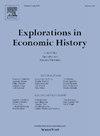恐惧的传染:恐慌、货币和大萧条
IF 1.7
1区 历史学
Q1 ECONOMICS
引用次数: 0
摘要
尽管银行业恐慌在有关大萧条原因和后果的辩论中占据核心地位,但它在此期间对货币供应的影响仍然是一个持续争论的话题。1936 年以前,美联储的分散结构意味着恐慌对货币创造的影响是区域性的,而货币冲动对银行稳定性的影响是全国性的。我们利用这种结构和新的数字化数据构建了美联储地区层面的货币总量,并采用了一种新颖的识别策略,使我们能够分离恐慌对货币总量的影响。我们发现,恐慌使货币供应量减少了 27%,换句话说,恐慌造成了 1929 年 6 月至 1932 年 12 月期间货币供应量的大部分下降。本文章由计算机程序翻译,如有差异,请以英文原文为准。
Contagion of fear: Panics, money, and the Great Depression
Despite its centrality in debates about the causes and consequences of the Great Depression, banking panics’ impact on the money supply during this period remains a subject of ongoing debate. Before 1936, the Fed's decentralized structure meant that panics impacted money creation regionally while monetary impulses impacted bank stability nationally. We use this structure and newly digitized data to construct monetary aggregates at the Federal Reserve district level and apply a novel identification strategy that allows us to isolate the panics’ impact on monetary aggregates. We find that panics reduced the money supply by 27%, or in other words, that panics caused most of the decline in the money supply from June 1929 to December 1932.
求助全文
通过发布文献求助,成功后即可免费获取论文全文。
去求助
来源期刊

Explorations in Economic History
Multiple-
CiteScore
2.50
自引率
8.70%
发文量
27
期刊介绍:
Explorations in Economic History provides broad coverage of the application of economic analysis to historical episodes. The journal has a tradition of innovative applications of theory and quantitative techniques, and it explores all aspects of economic change, all historical periods, all geographical locations, and all political and social systems. The journal includes papers by economists, economic historians, demographers, geographers, and sociologists. Explorations in Economic History is the only journal where you will find "Essays in Exploration." This unique department alerts economic historians to the potential in a new area of research, surveying the recent literature and then identifying the most promising issues to pursue.
 求助内容:
求助内容: 应助结果提醒方式:
应助结果提醒方式:


